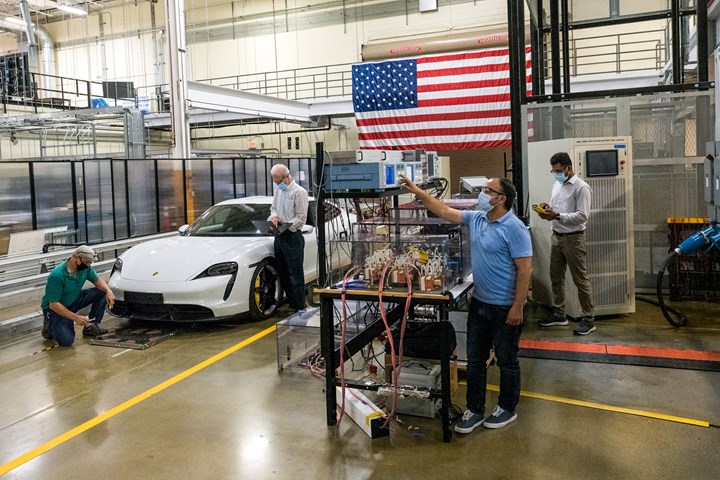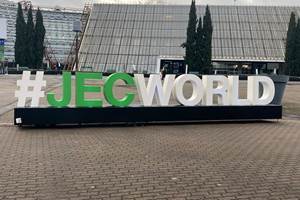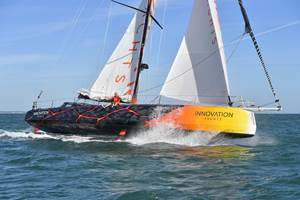Volkswagon launches new research collaboration with ORNL, University of Tennesse, Knoxville
Projects involve integration of advanced functional materials, novel recycling and wireless charging concepts to support electric mobility and sustainable transportation.

Oak Ridge National Laboratory (ORNL) researchers work in the Extreme Fast-Charging Lab in ORNL’s Grid Research Integration and Deployment Center. Photo Credit: Carlos Jones/ORNL, U.S. Dept. of Energy
Volkswagen Group of America’s (Herndon, Va., U.S.) Innovation Hub Knoxville (Tenn., U.S.), the company’s technology unit for applied materials science, has expanded its research collaboration with Oak Ridge National Laboratory (ORNL, Knoxville, Tenn., U.S.), reported to be the largest U.S. Department of Energy (DOE) science and energy laboratory, and the University of Tennessee, Knoxville (UT). The expanded collaboration aims to explore how to integrate breakthroughs in material science and recycling concepts — including fiber-reinforced composites — to support electric mobility and sustainable transportation. The first project involves testing ORNL’s new high-power wireless EV charging concepts with a Porsche Taycan.
“We aim to leverage the unique knowledge and innovative power the Tennessee Valley holds,” says Scott Keogh, president and CEO at Volkswagen Group of America Inc. “Volkswagen is focused to push electric mobility and new technologies for more sustainable transportation. Expanding our research collaboration with Oak Ridge National Laboratory and the University of Tennessee will help drive these efforts.” The expanded working relationship is just another example of Volkswagen’s growing engineering and technology footprint in the U.S., Keogh adds.
The interdisciplinary teams have started testing new wireless charging concepts for electric vehicles (EVs), with the goal to develop a higher power wireless charger through breakthrough designs that focus electromagnetic waves to eliminate interference, thus increasing efficiency. In the first trials, a prototype system has shown a high level of efficiency, with up to 98% of the energy used (coil-to-coil) reaching the vehicle battery.
“We are excited to work with Volkswagen to demonstrate ORNL’s high-powered, ultra-efficient wireless charging technology,” says Xin Sun, associate laboratory director for Energy Science and Technology at ORNL. “Our unique polyphase electromagnetic coil design and power electronics provide high power transfer levels in a compact system, with the potential to alleviate EV range anxiety and speed the decarbonization of the U.S. transportation sector.” The wireless charging project is supported by the DOE Office of Energy Efficiency & Renewable Energy’s Vehicle Technologies Office.
Using Volkswagen’s expertise in vehicle integration, the teams also have been able to build from a charging power level of 6.6 kilowatts up to 120 kilowatts, with a goal of 300 kilowatts, enough to provide an 80% recharge of the Porsche Taycan in about 10 minutes. The research project aims to generate new insights into the technological and physical hurdles of high-power wireless charging for automobiles.
Other research projects at Volkswagen’s Innovation Hub Knoxville focus on advanced functional materials, including composite car body parts and plant-based materials for future interior designs. The team is also working on new recycling concepts for materials conventionally deemed non-recyclable, such as fiber-reinforced composites.
“Our work with Volkswagen fits with our vision to create a more just, prosperous, and sustainable future through our research,” says Deb Crawford, UT Knoxville vice chancellor for research and innovation. “Volkswagen is a model innovation partner, and understands the value that co-location with a world-class research university creates. Together, we are identifying technological solutions that could lead to a more sustainable future for our planet.”
Volkswagen is a member of the Institute for Advanced Composites Manufacturing Innovation (IACMI, Knoxville, Tenn., U.S.), a research and innovation consortium funded at UT by the DOE. Volkswagen also works closely with UT Chattanooga, an MBA program that lets its employees earn the degree by taking classes at the Chattanooga assembly plant or on campus.
Volkswagen Group of America opened its Innovation Hub Knoxville in early 2020, in partnership with UT. Since then, the unit has established working relationships with universities and key researchers in the region. The Innovation Hub Knoxville joins the global Volkswagen Group’s larger innovation ecosystem, including innovation centers in Belmont, California; Wolfsburg, Germany; and Beijing, China, along with hubs in Barcelona, Spain; Tel Aviv, Israel; and Tokyo, Japan.
“The global Volkswagen Group aims to build a more sustainable vision of future mobility worldwide, and we connect the best researchers in the world to make that a reality,” concludes Nikolai Ardey, executive director group research at Volkswagen Group. “Co-innovating with partners like Oakridge National Laboratory and the University of Tennessee helps to multiply the power of Volkswagen’s international innovation team.”
Related Content
Partners recycle A350 composite production waste into adjustable-length rods for MFFD
Herone, Spiral RTC, Teijin Carbon Europe and Collins Aerospace Almere recycle A350 thermoplastic composite clips/cleats waste into rods for the all-thermoplastic composite Multifunctional Fuselage Demonstrator’s crown.
Read MoreJEC World 2024 highlights: Glass fiber recycling, biocomposites and more
CW technical editor Hannah Mason discusses trends seen at this year’s JEC World trade show, including sustainability-focused technologies and commitments, the Paris Olympics amongst other topics.
Read MoreEuropean boatbuilders lead quest to build recyclable composite boats
Marine industry constituents are looking to take composite use one step further with the production of tough and recyclable recreational boats. Some are using new infusible thermoplastic resins.
Read MoreWatch: A practical view of sustainability in composites product development
Markus Beer of Forward Engineering addresses definitions of sustainability, how to approach sustainability goals, the role of life cycle analysis (LCA) and social, environmental and governmental driving forces. Watch his “CW Tech Days: Sustainability” presentation.
Read MoreRead Next
Scaling up, optimizing the flax fiber composite camper
Greenlander’s Sherpa RV cab, which is largely constructed from flax fiber/bio-epoxy sandwich panels, nears commercial production readiness and next-generation scale-up.
Read MoreCeramic matrix composites: Faster, cheaper, higher temperature
New players proliferate, increasing CMC materials and manufacturing capacity, novel processes and automation to meet demand for higher part volumes and performance.
Read MoreNext-gen fan blades: Hybrid twin RTM, printed sensors, laser shock disassembly
MORPHO project demonstrates blade with 20% faster RTM cure cycle, uses AI-based monitoring for improved maintenance/life cycle management and proves laser shock disassembly for recycling.
Read More












